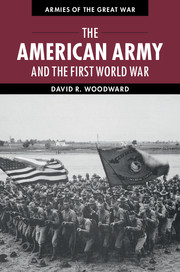Book contents
- Frontmatter
- Dedication
- Contents
- List of figures
- List of maps
- List of tables
- Preface
- List of abbreviations
- Introduction
- 1 Birth of a modern army
- 2 World war and American preparedness
- 3 Coercive power and Wilsonian diplomacy
- 4 “You’re in the army now”
- 5 US army doctrine and industrialized trench warfare
- 6 Over where?
- 7 American Expeditionary Force organization, overseas training, and deployment
- 8 Will the Americans arrive in time?
- 9 Failed expectations: “the military establishment of the United States has fallen down”
- 10 Atlantic ferry
- 11 Neck of the bottle
- 12 Uncertain times
- 13 Cantigny
- 14 Into the breach
- 15 American soldiers in north Russia and Siberia
- 16 The beginning of the end
- 17 Establishment of the American First Army and Saint-Mihiel
- 18 Meuse-Argonne, September 26–October 31
- 19 Breakout, November 1–11
- 20 Epilogue
- Notes
- Bibliography
- Index
4 - “You’re in the army now”
Published online by Cambridge University Press: 05 July 2014
- Frontmatter
- Dedication
- Contents
- List of figures
- List of maps
- List of tables
- Preface
- List of abbreviations
- Introduction
- 1 Birth of a modern army
- 2 World war and American preparedness
- 3 Coercive power and Wilsonian diplomacy
- 4 “You’re in the army now”
- 5 US army doctrine and industrialized trench warfare
- 6 Over where?
- 7 American Expeditionary Force organization, overseas training, and deployment
- 8 Will the Americans arrive in time?
- 9 Failed expectations: “the military establishment of the United States has fallen down”
- 10 Atlantic ferry
- 11 Neck of the bottle
- 12 Uncertain times
- 13 Cantigny
- 14 Into the breach
- 15 American soldiers in north Russia and Siberia
- 16 The beginning of the end
- 17 Establishment of the American First Army and Saint-Mihiel
- 18 Meuse-Argonne, September 26–October 31
- 19 Breakout, November 1–11
- 20 Epilogue
- Notes
- Bibliography
- Index
Summary
Prior to Congressional approval of selective service, Baker had ordered the printing of some 10 million registration forms, hiding them in the basement of a post office in the capital, stacked from floor to ceiling. He now secretly shipped them to some 40,000 sheriffs, who served ex-officio as representatives of the national government in conducting the registration and subsequent drafting of young men into the armed services. The government avoided the word “conscript,” using “selective service” instead because draftees were chosen through a selective system administered by the local draft boards. As opposed to the existing Regular Army and National Guard, both composed of volunteers, the government euphemistically called this new army raised by selective “coercion” the “National Army.”
The Wilson administration also sought to soften the reality of forcing almost 10 million young American males to register as a preliminary step toward possible induction into the armed forces. Using the Committee on Public Information (CPI), which had been created by an executive order on April 13, 1917, Wilson attempted to mobilize the nation through an extensive and unprecedented government propaganda campaign. “Carried in all our hearts as a great day of patriotic devotion and obligation,” he proclaimed, “when the duty shall lie upon every man to see to it that the name of every male person of the designated ages is written on these lists of honor.” He then published this “Call to Arms” throughout the United States. Threats accompanied the President’s appeals to patriotism. On the eve of registration the US attorney general, Thomas Watt Gregory, instructed all US attorneys and marshals to arrest anyone attempting to disrupt the registration drive. Within the next few days, the government arrested twenty-one people and threatened them with imprisonment.
- Type
- Chapter
- Information
- The American Army and the First World War , pp. 49 - 72Publisher: Cambridge University PressPrint publication year: 2014

